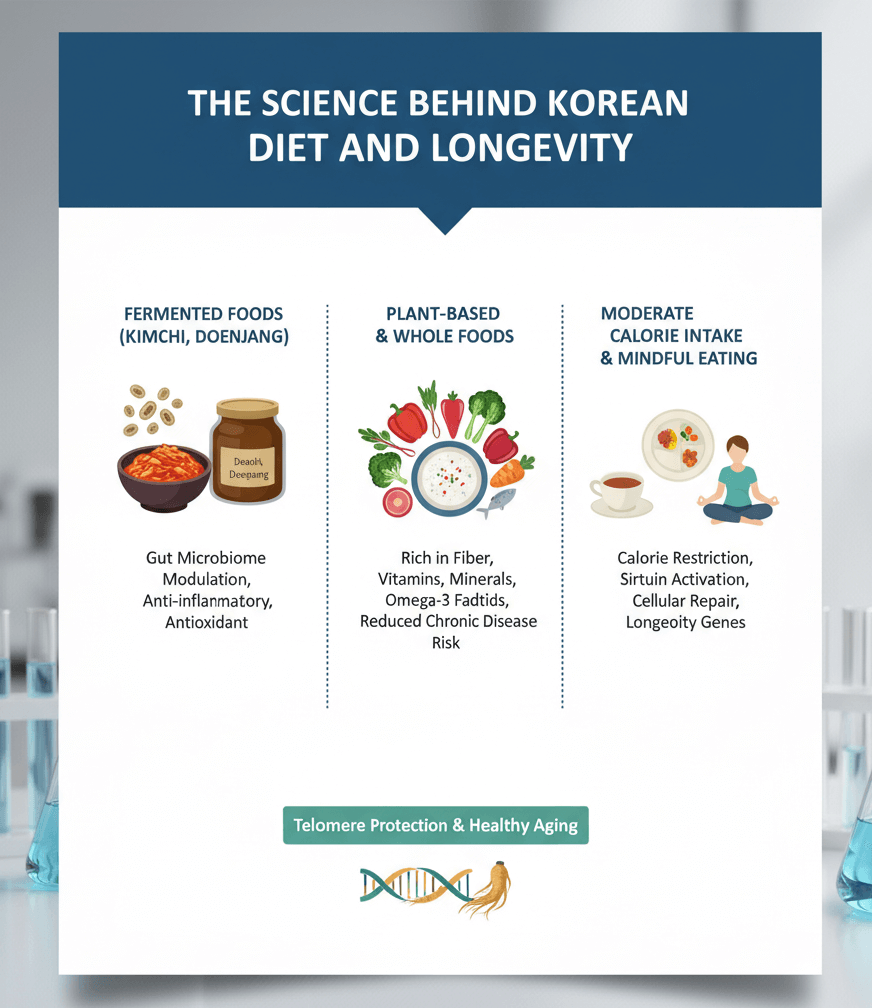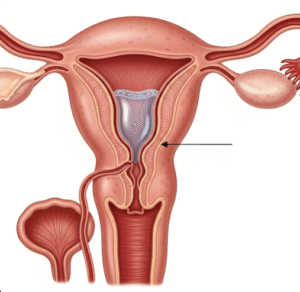Korea is widely recognized for its impressive life expectancy and overall health, ranking among the top countries for longevity. While genetics and healthcare access play a part, much of the credit goes to the Korean diet and lifestyle—a balanced, nutrient-rich way of eating that supports both physical and mental well-being. The science behind it reveals how centuries-old food traditions, fermentation, and mindful eating all work together to promote long, healthy lives.
➤ A Balanced Approach to Nutrition
At the core of the Korean diet is balance — in flavor, color, and nutrients. A traditional Korean meal includes rice, soup, and several side dishes known as banchan. This structure ensures a wide range of vitamins, minerals, and antioxidants in every meal.
Scientific insights:
- Meals typically consist of 70% plant-based foods such as vegetables, seaweed, beans, and grains.
- The average Korean consumes less red meat and saturated fat than people in most Western countries.
- Meals are often low in sugar and artificial additives, reducing inflammation and metabolic stress.
This balanced nutritional pattern helps regulate blood pressure, maintain healthy cholesterol, and support digestive function — all critical for preventing chronic diseases linked to aging.
➤ Fermented Foods and Gut Health
Fermentation is the backbone of Korean cuisine. Foods like kimchi, doenjang (fermented soybean paste), gochujang (red chili paste), and ganjang (soy sauce) are rich in beneficial bacteria that boost gut microbiota diversity.
Scientific findings show:
- Fermented foods contain probiotics that enhance gut flora, improving digestion and nutrient absorption.
- Regular consumption of kimchi has been associated with lower cholesterol, reduced body fat, and improved insulin sensitivity.
- The fermentation process increases bioavailability of vitamins and natural antioxidants.
Gut health plays a direct role in immunity, metabolism, and even mood regulation. This explains why Koreans who eat fermented foods daily tend to have stronger immune systems and slower cellular aging.
➤ Antioxidants and Disease Prevention
The Korean diet is naturally rich in antioxidant compounds that protect the body from oxidative stress — one of the leading causes of aging and chronic disease.
Common ingredients like garlic, sesame oil, perilla leaves, red pepper, ginger, and green tea provide powerful antioxidants that help neutralize free radicals.
Research supports that:
- Regular intake of garlic and chili pepper can reduce the risk of cardiovascular disease.
- Polyphenols found in green tea and fermented soybean products contribute to lower cancer rates.
- Antioxidants in gochugaru (Korean red pepper flakes) have anti-inflammatory and anti-aging effects on cells.
This daily exposure to plant-based antioxidants contributes to the longevity and vitality commonly observed in older Koreans.
➤ Portion Control and Mindful Eating
Korean meals emphasize moderation rather than excess. Dishes are served in small bowls, encouraging controlled portions and mindful eating.
Instead of overeating, Koreans often practice a cultural form of restraint similar to Japan’s hara hachi bu — eating until about 80% full.
Scientific benefits include:
- Lower calorie intake without nutrient deficiency.
- Reduced risk of obesity and related diseases such as diabetes and heart problems.
- Improved digestion and energy balance.
This simple yet powerful habit helps maintain a healthy weight and metabolism, which are key to a long life.
➤ Minimal Processed Foods
The traditional Korean kitchen focuses on natural ingredients and homemade dishes. Processed foods, sugary snacks, and refined oils have only recently entered the diet — and many older Koreans still avoid them.
Most meals are cooked from scratch using fresh produce, grains, and fermented sauces, minimizing the intake of preservatives and additives. This leads to better gut health, fewer toxins, and reduced inflammation over time.
➤ Healthy Cooking Methods
Cooking techniques in Korean cuisine also contribute to its health benefits. Common methods include steaming, boiling, fermenting, grilling, and stir-frying with minimal oil. Deep-fried dishes are less common than in Western diets.
Steaming and boiling preserve nutrients while reducing fat content. Soups and stews, rich in vegetables and lean proteins, provide hydration and essential electrolytes. Together, these methods support heart health and digestive efficiency.
➤ Seafood and Plant-Based Proteins
As a peninsula surrounded by ocean, Korea has long relied on fish and seafood as primary protein sources. Anchovies, mackerel, squid, clams, and seaweed are common in daily meals.
Seafood is a rich source of omega-3 fatty acids, which are known to:
- Support brain and heart health
- Reduce inflammation
- Improve blood circulation
Plant-based proteins such as tofu, soybeans, and legumes are also staples, reducing the reliance on animal fats while ensuring adequate protein intake for muscle maintenance and longevity.
➤ Cultural Habits that Reinforce Health
Beyond food, the Korean lifestyle itself promotes health and longevity. Eating together, walking after meals, and maintaining strong family and social bonds all contribute to emotional stability and stress reduction.
Koreans also value regular physical activity, whether through walking, hiking, or gentle exercises like stretching and yoga. This consistent, low-intensity movement helps keep the body flexible and the cardiovascular system strong well into old age.
➤ Scientific Perspective on Longevity
Studies on Korean dietary patterns have shown clear connections to lower rates of heart disease, obesity, and metabolic syndrome. The combination of fiber-rich foods, fermented ingredients, and antioxidants contributes to better gut function, reduced inflammation, and improved immune response.
A 2024 Korean Nutrition Institute study found that older adults following a traditional diet pattern lived up to 6–8 years longer on average than those who consumed mostly processed Western-style foods. This demonstrates how ancient food traditions remain scientifically relevant for modern health.
➤ Conclusion
The Korean diet is more than just food—it’s a philosophy of balance, moderation, and respect for nature. Through fermented foods, fresh vegetables, lean proteins, and mindful eating habits, Koreans have built a lifestyle that promotes both longevity and vitality.
The science is clear: this combination of nutrient density, gut-friendly fermentation, and cultural mindfulness protects the body at every level—from cells to the immune system. For anyone seeking a naturally sustainable way to live longer and feel stronger, the Korean way of eating offers a proven and inspiring model for health and happiness.













